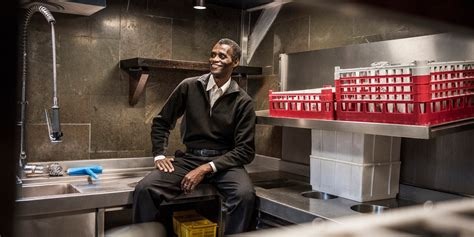

Why the Dishwasher Got 10% of the World’s Best Restaurant
Steve Weiss, ACC
Transformational Leadership Academy
In 2017, world-renowned chef René Redzepi stood before a crowd of press and staff in Copenhagen and made a surprising announcement. As part of Noma’s next chapter—the restaurant often named the best in the world—he was naming three new partners.
One of them was Ali Sonko, a dishwasher.
Noma wasn’t just a good restaurant. It was crowned World’s Best Restaurant by Restaurant magazine in 2010, 2011, 2012, 2014, and again in 2021. It redefined modern Nordic cuisine and became a global benchmark for innovation and excellence in fine dining.
So when a man who had washed dishes for over a decade was given a 10% ownership stake, it made headlines. It felt unusual. Heartwarming. Radical.
But look closer, and you’ll see: this wasn’t a sentimental gesture. It was a leadership decision—one grounded in trust, values, and long-term impact.
Ali Sonko didn’t just clean plates. He carried the soul of the restaurant.
What Redzepi Actually Said
The story, as told by Redzepi and confirmed in multiple public accounts, unfolds like this:
Ali, a Gambian immigrant and father of 12, had worked at Noma since its founding in 2003. When he was made a partner in 2017, Redzepi said:
“Ali is the heart and soul of Noma. He has spent every hour of every day working harder than anyone else. He’s always smiling.”
— René Redzepi, 2017 press conference
He also offered a deeply personal reflection:
“He reminds me of my father.”
— Redzepi, via Instagram
In 2010, when Ali couldn’t attend Noma’s first “World’s Best Restaurant” award ceremony due to visa issues, the entire team wore T-shirts with his face on them. It was a statement of solidarity rarely seen in fine dining—an expression of affection, gratitude, and respect.
Redzepi didn’t list leadership traits. He didn’t need to. What he said—and what the team showed—tells us everything.
What I See in Ali’s Leadership
As a leadership coach and educator, I spend a lot of time helping people recognize leadership in all its forms—especially the quiet kind. Redzepi never used corporate language or theory, but Ali’s story reveals five leadership traits that I believe made his partnership not just symbolic, but essential.
1. Reliability That Built Trust
“He has spent every hour of every day working harder than anyone else.”
Ali’s work ethic was unmatched. Over 14 years, he was a constant in a high-turnover, high-pressure kitchen. His consistency created stability. That alone is a form of leadership.
2. Emotional Intelligence
“He’s always smiling.”
Even on the hardest days, Ali brought warmth and calm. That demeanor became a kind of emotional ballast for the team. In stressful environments, this is the trait people lean on most.
3. Cultural Embodiment
“He reminds me of my father.”
Redzepi’s father was also a dishwasher—an immigrant who worked hard, stayed humble, and held his family together. In Ali, Redzepi saw those same traits. This wasn’t just personal; it was cultural. Ali embodied the values Noma was built on: humility, care, and quiet excellence.
4. Peer Influence Without Authority
No formal title. No managerial power. But when Ali was missing from the biggest awards night of their careers, the team wore shirts with his face on them. That doesn’t happen because someone is nice. That happens because someone is deeply respected.
5. Invisible Stewardship
Ali wasn’t on stage. He wasn’t quoted in press releases. But he showed up every day, making the people around him better. When Noma restructured, Redzepi wasn’t just rewarding loyalty—he was securing the soul of the restaurant for the future.
Why Ownership Made Sense
This wasn’t charity. This was succession planning.
Noma was evolving, and Redzepi wanted to build the next version on stronger foundations. That meant recognizing not just who led from the front—but who anchored the team from within.
“They are a huge part of why we are here today.” — Redzepi, on the three new partners
Ali’s impact wasn’t theoretical. It was lived, daily, for years.
Reflection for Leaders
The real question isn’t why Ali Sonko got 10% of Noma.
The real question is: Would you recognize an Ali on your team?
Would you be willing to share power with someone who leads quietly, without a title—but whose presence makes everything work better?
Leadership doesn’t always wear a chef’s coat. Sometimes it wears an apron and stands at the sink.
And if you’re paying attention, that might just be where your next partner is standing right now.
Source: Fortune / EPA / Asger Ladefoged
Contact Info
steve@leadwithtla.com
216-288-4548
